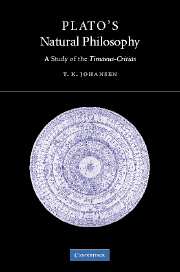Book contents
- Frontmatter
- Contents
- Acknowledgements
- Introduction: Plato's tales of teleology
- 1 What is the Timaeus-Critias about?
- 2 The status of the Atlantis story
- 3 The status of Timaeus' account
- 4 Teleology and craftsmanship
- 5 Necessity and teleology
- 6 Space and motion
- 7 Body, soul, and tripartition
- 8 Perception and cosmology
- 9 Dialogue and dialectic
- Epilogue
- Bibliography
- General index
- Index locorum
5 - Necessity and teleology
Published online by Cambridge University Press: 03 September 2009
- Frontmatter
- Contents
- Acknowledgements
- Introduction: Plato's tales of teleology
- 1 What is the Timaeus-Critias about?
- 2 The status of the Atlantis story
- 3 The status of Timaeus' account
- 4 Teleology and craftsmanship
- 5 Necessity and teleology
- 6 Space and motion
- 7 Body, soul, and tripartition
- 8 Perception and cosmology
- 9 Dialogue and dialectic
- Epilogue
- Bibliography
- General index
- Index locorum
Summary
For Timaeus, as we saw in the last chapter, the world is a product of craftsmanship. However, craftsmanship is not the only cause of the cosmos. Another is ‘necessity’. The introduction of this cause occasions Timaeus to make a fresh beginning to his cosmology at 47e3–48b3:
Now our foregoing discourse, save for a few matters, has set forth the works wrought by the craftsmanship of reason; but we must now set beside them the things that come about of necessity. For the generation of this universe was a mixed result of the combination of necessity and reason. Reason overruled necessity by persuading her to guide the greatest part of the things that become towards what is best; in that way and on that principle this universe was fashioned in the beginning by the victory of reasonable persuasion over necessity. If, then, we are really to tell how it came into being on this principle, we must bring in also the wandering cause – in what manner its nature is to cause motion. So we must return upon our steps thus, and taking, in its turn, a second principle concerned in the origin of these same things, start once more upon our present theme from the beginning, as we did upon the theme of our earlier discourse.
(Cornford transl.)It should perhaps come as no surprise to us that the demiurge needed another principle apart from reason when he fashioned the universe.
- Type
- Chapter
- Information
- Plato's Natural PhilosophyA Study of the Timaeus-Critias, pp. 92 - 116Publisher: Cambridge University PressPrint publication year: 2004



